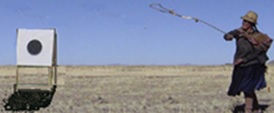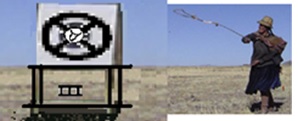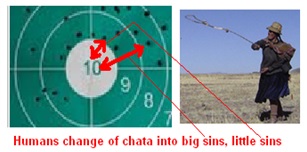| What is sinning? Welcome to Sinning Solutions.Q1: What is sinning? The Bible defines "sin" as an action word or verb, as "missing the mark". Notice this Bible verse: Judges 20:16 Among all this people there were seven hundred chosen men lefthanded; every one could sling stones at an hair breadth, and not miss "chata". (KJV)Sinning is defined as missing  In Bible times the slingers were experts at throwing stones with precision. In order to measure this ability you need a relationship between three objects. (1) The slinger(2) The standard (3) The medium In Bible times the slingers were experts at throwing stones with precision. In order to measure this ability you need a relationship between three objects. (1) The slinger(2) The standard (3) The mediumThe slinger was a human person who usually spent years training often with better success and often learning from times of missing the standard target. The standard was a target of some sort, shown by some drawing, usually a circle. The medium was a place to show the performance attempt. It was soft enough to make one see the mark of the stone but hard enough not to fall away under the slingers assault on the medium. The Hebrew word for sin is chata. It is made of three letters from ancient pictograph times. The letters tells us the meaning of chata. The outside basket-covering strong. Strong's 2398. The Hebrew word for sin is chata. It is made of three letters from ancient pictograph times. The letters tells us the meaning of chata. The outside basket-covering strong. Strong's 2398.
 The outside was a wall or tent wall supported by tent poles, and here we see the medium outside supported by poles and a frame of wood.The basket was a covering, a place where the good things were gathered, a covering place for good. The basket of concentric rings was the standard the slinger aimed for. Lastly is the bull, the symbol of strength, the centre of 100% precision; called the bull's eye. The result of each performance was measured with a knotted string from the slingers attempt in a literal distance from the intended standard mark, to the mark made by the stone. The outside was a wall or tent wall supported by tent poles, and here we see the medium outside supported by poles and a frame of wood.The basket was a covering, a place where the good things were gathered, a covering place for good. The basket of concentric rings was the standard the slinger aimed for. Lastly is the bull, the symbol of strength, the centre of 100% precision; called the bull's eye. The result of each performance was measured with a knotted string from the slingers attempt in a literal distance from the intended standard mark, to the mark made by the stone.
 Today we have changed the meaning of chata, and we talk about the measurements of missing the mark, rather than the slinger who missed the mark. Today we have changed the meaning of chata, and we talk about the measurements of missing the mark, rather than the slinger who missed the mark.
 So we add up our scores and we have come accustomed to missing the mark so often we now measure our performance with numbers of how close we were to the standard mark. And so the label of measuring the amount of missing the mark, has become a gradual term we call "sin". When we say I sinned a big sin, we imply I have missed the mark really badly, way off. When we say I sinned a little sin, we imply we have missed the mark only a little, coming close to the bull's eye of perfection. Is this cultural change of changing "chata" into a thing we call "sin", correct ? Has sin become a noun in our understanding today ? Have we lost the Bible meaning ? So we add up our scores and we have come accustomed to missing the mark so often we now measure our performance with numbers of how close we were to the standard mark. And so the label of measuring the amount of missing the mark, has become a gradual term we call "sin". When we say I sinned a big sin, we imply I have missed the mark really badly, way off. When we say I sinned a little sin, we imply we have missed the mark only a little, coming close to the bull's eye of perfection. Is this cultural change of changing "chata" into a thing we call "sin", correct ? Has sin become a noun in our understanding today ? Have we lost the Bible meaning ?
Sinning theme  |
|
 See for more themes.
See for more themes.